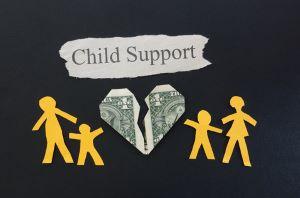630-462-9500
After Hour New Client Telephone Number 630-690-6077
1776 S. Naperville Road, Building B, Suite 202,
Wheaton, IL 60189
Recent Blog Posts
What Happens if I Fall Behind on My Child Support Payments?
 Child support payments are intended to provide a parent with the financial support he or she needs to cover housing, education, and other child-related costs. Illinois has adopted the “Income Shares” model for child support calculations. The amount a parent pays in child support in Illinois is typically based on the difference between the parents' net incomes. This calculation method is designed to ensure that payments provide for the child's needs and are reasonably affordable for the paying parent or “obligor.” However, circumstances can change, and obligor parents may find themselves in a situation where they cannot fulfill their child support obligations. If you are a parent who has fallen behind on child support payments in Illinois, you may wonder what types of consequences you may face. You may also question whether there is anything you can do to remedy the situation.
Child support payments are intended to provide a parent with the financial support he or she needs to cover housing, education, and other child-related costs. Illinois has adopted the “Income Shares” model for child support calculations. The amount a parent pays in child support in Illinois is typically based on the difference between the parents' net incomes. This calculation method is designed to ensure that payments provide for the child's needs and are reasonably affordable for the paying parent or “obligor.” However, circumstances can change, and obligor parents may find themselves in a situation where they cannot fulfill their child support obligations. If you are a parent who has fallen behind on child support payments in Illinois, you may wonder what types of consequences you may face. You may also question whether there is anything you can do to remedy the situation.
Tips for Sharing Custody of Your Children During the Holidays
 This holiday season is shaping up to be like none other. If you are in the middle of a separation or divorce, your holiday season may be especially complicated. Sharing custody of children with a soon-to-be ex-spouse is hard enough, but sharing custody during the holidays can be even harder. Keep the following tips and suggestions in mind to help your holiday season go as smoothly as possible for you and your children:
This holiday season is shaping up to be like none other. If you are in the middle of a separation or divorce, your holiday season may be especially complicated. Sharing custody of children with a soon-to-be ex-spouse is hard enough, but sharing custody during the holidays can be even harder. Keep the following tips and suggestions in mind to help your holiday season go as smoothly as possible for you and your children:
Plan the Details in Advance
When a couple with children files for divorce in Illinois, they have 120 days to create and submit a “parenting plan.” This plan will describe how they will make major decisions about the child, who the child will live with on what days, how the child will be transported between homes, and much more. If you have not yet filed for divorce, or if you have not made any decisions about the allocation of parental responsibilities and parenting time, you may only have a casual agreement about which parent the children will see on which days. This can lead to miscommunication and frustration. It is better to plan your holidays in advance. Decide where the children will stay on what days, when they will be picked up and dropped off, and other details, and then put these decisions in writing.
What Is the “Safe Haven Law” in Illinois?
 Being a parent is one of the greatest responsibilities in the world. Parents who worry about their ability to take on this tremendous responsibility may make the decision to relinquish their parental rights and place their children for adoption. Many parents choose to do this because they realize that financial problems, addictions, or other concerns will prevent them from giving their child the life he or she deserves. However, some parents are not in a position to go through the traditional methods of adoption, and they may choose to take advantage of Illinois' “Safe Haven Law.” If you are considering adopting a child in Illinois, you may want to learn about this law and how it can affect your adoption.
Being a parent is one of the greatest responsibilities in the world. Parents who worry about their ability to take on this tremendous responsibility may make the decision to relinquish their parental rights and place their children for adoption. Many parents choose to do this because they realize that financial problems, addictions, or other concerns will prevent them from giving their child the life he or she deserves. However, some parents are not in a position to go through the traditional methods of adoption, and they may choose to take advantage of Illinois' “Safe Haven Law.” If you are considering adopting a child in Illinois, you may want to learn about this law and how it can affect your adoption.
The Illinois Abandoned Newborn Infant Protection Act
Making the decision to give up an infant is one of the hardest things a person can do. Parents may not only mourn the loss of their child, they may also fear retribution for giving the infant up for adoption. Sometimes, a mother chooses to relinquish her parental rights at the hospital immediately after the infant is born. Other times, a mother cannot or will not place the baby for adoption in the usual manner.
What Methods Do Spouses Use to Hide Property in a Divorce?
 When two people join their lives in marriage, “yours” and “mine” become “ours.” According to Illinois law, spouses have the right to an equitable division of marital assets during divorce. Any property that was accumulated during the marriage by either spouse is part of the marital estate and subject to division. This property may include household items, jewelry, vehicles, and other physical property, as well as retirement accounts, investments, business interests, and other complex assets. Spouses who do not want to share the marital estate fairly may try to manipulate the asset division process during divorce by hiding assets or property. Some of the most common methods of concealing assets include:
When two people join their lives in marriage, “yours” and “mine” become “ours.” According to Illinois law, spouses have the right to an equitable division of marital assets during divorce. Any property that was accumulated during the marriage by either spouse is part of the marital estate and subject to division. This property may include household items, jewelry, vehicles, and other physical property, as well as retirement accounts, investments, business interests, and other complex assets. Spouses who do not want to share the marital estate fairly may try to manipulate the asset division process during divorce by hiding assets or property. Some of the most common methods of concealing assets include:
What Are My Rights as an Unmarried Father in Illinois?
 If you recently found out that your current or former dating partner is pregnant, you may have questions about your legal rights. You may wonder if you have the same rights to your child as the child's mother or what you need to do to obtain these rights. You may also have questions about how child custody and parenting time will be divided once the child is born. In Illinois, fathers have the same rights as mothers. However, there are certain steps you will need to take in order to establish these important rights.
If you recently found out that your current or former dating partner is pregnant, you may have questions about your legal rights. You may wonder if you have the same rights to your child as the child's mother or what you need to do to obtain these rights. You may also have questions about how child custody and parenting time will be divided once the child is born. In Illinois, fathers have the same rights as mothers. However, there are certain steps you will need to take in order to establish these important rights.
Paternity Laws in Illinois
When a married couple has a child, the law automatically assumes that the husband of the woman giving birth is the child's father. He does not need to take additional steps to establish his paternity. However, the same is not true for unmarried fathers. To establish legal parentage of your child, you and the child's mother will need to sign a Voluntary Acknowledgement of Paternity (VAP) form. This form is typically available at the hospital where the child is born, or it may be obtained through the Illinois Healthcare and Family Services department or your local county clerk. If there is a question as to your biological relationship to the child, you may need to take a DNA test before you can establish paternity.
What Should I Do if My Spouse Makes Untrue Accusations During Divorce?
 Divorce can bring out the worst in people. If you are contemplating divorce or have already decided to end your marriage, you may have concerns about your ex making false accusations against you. Some people make up lies about their spouse during divorce out of bitterness and spite. Even if the accusations are not founded in reality, they have the potential to cause significant problems for the accused spouse. If your spouse has accused you of abuse, violence, hiding assets, or other forms of wrongdoing, it is important to work with an experienced divorce lawyer.
Divorce can bring out the worst in people. If you are contemplating divorce or have already decided to end your marriage, you may have concerns about your ex making false accusations against you. Some people make up lies about their spouse during divorce out of bitterness and spite. Even if the accusations are not founded in reality, they have the potential to cause significant problems for the accused spouse. If your spouse has accused you of abuse, violence, hiding assets, or other forms of wrongdoing, it is important to work with an experienced divorce lawyer.
Keep a Detailed Record of Your Actions and the Accusations
One of the best ways to help your lawyer prove that your soon-to-be ex-spouse is lying about your alleged abuse or other misconduct is to gather evidence. Keep records of any text messages, voicemails, or emails that your spouse sends you. Make sure to also log or write down your own actions. You may be able to use this information to prove that your spouse's claims are untrue. For example, if your spouse accuses you of harming him or her on a certain date, you may be able to produce evidence that shows that you were out of town on this particular date. Demonstrating inconsistencies in your spouse's claims will weaken his or her credibility and help you defend yourself against the false accusations.
Will Current Child Support Payments Affect New Child Support Obligations?
 When married parents get divorced, or unmarried parents split up, one parent may be required to pay child support. The purpose of child support payments is to help the parent with the majority of parenting time pay for the costs associated with the child's housing, nutrition, clothing, and other needs. Child support also helps ensure that a child with unmarried or divorced parents enjoys a standard of living that is similar to what he or she would have received if his or her parents were still married. However, child support can also be a significant expense for the paying or “obligor” parent – especially when the parent has more than one child support obligation.
When married parents get divorced, or unmarried parents split up, one parent may be required to pay child support. The purpose of child support payments is to help the parent with the majority of parenting time pay for the costs associated with the child's housing, nutrition, clothing, and other needs. Child support also helps ensure that a child with unmarried or divorced parents enjoys a standard of living that is similar to what he or she would have received if his or her parents were still married. However, child support can also be a significant expense for the paying or “obligor” parent – especially when the parent has more than one child support obligation.
Child Support Considerations for Parents with Multiple Families
If you are a parent who is already paying child support, and you are considering divorce, you may have questions about how the child support you currently pay will affect your new obligations. You may wonder if you will be required to pay child support to both families, and if so, how you will afford multiple obligations. Child support payment amounts are typically calculated using a statutory formula described in the Illinois Marriage and Dissolution of Marriage Act (IMDMA). The amount that a parent is asked to pay is determined through the “Income Shares” calculation method. The Income Shares model involves four main steps:
What Issues Must Be Addressed in an Illinois Parenting Plan?
 If you are a parent who is getting divorced in Illinois, you will need to create a parenting plan or parenting agreement. According to Illinois law, parents must file a parenting plan within 120 days of filing for divorce. If they cannot agree on a parenting plan, they may each file their proposed plan separately from the other spouse. Parents who disagree may be able to negotiate a settlement through mediation or with help from their attorneys. If parents cannot reach an agreement, the court may need to intervene.
If you are a parent who is getting divorced in Illinois, you will need to create a parenting plan or parenting agreement. According to Illinois law, parents must file a parenting plan within 120 days of filing for divorce. If they cannot agree on a parenting plan, they may each file their proposed plan separately from the other spouse. Parents who disagree may be able to negotiate a settlement through mediation or with help from their attorneys. If parents cannot reach an agreement, the court may need to intervene.
Parental Responsibilities and Parenting Time
You and your spouse will need to make determinations about child custody, which is now referred to as the allocation of parental responsibilities, and parenting time. Parental responsibilities refers to decision-making authority about children's medical care, education, extracurricular activities, and religion. Parenting time refers to the days and times that a parent directly cares for the child.
How Is a Professional Practice Handled in an Illinois Divorce?
 One of the most significant parts of the divorce process is the division of marital assets and debts. Some divorcing couples are able to reach an agreement about property distribution through attorney-assisted negotiations. Others reach property distribution settlements through an alternative dispute resolution method like mediation or collaborative law. When a property distribution agreement cannot be reached, the case may go to trial. Complex assets such as investments, small businesses, and professional practices are often especially difficult to quantify and divide during divorce. If you are a doctor, accountant, or other professional, and you own your own practice, you should understand how the decisions about this practice may impact your divorce.
One of the most significant parts of the divorce process is the division of marital assets and debts. Some divorcing couples are able to reach an agreement about property distribution through attorney-assisted negotiations. Others reach property distribution settlements through an alternative dispute resolution method like mediation or collaborative law. When a property distribution agreement cannot be reached, the case may go to trial. Complex assets such as investments, small businesses, and professional practices are often especially difficult to quantify and divide during divorce. If you are a doctor, accountant, or other professional, and you own your own practice, you should understand how the decisions about this practice may impact your divorce.
Determining the Identity of a Professional Practice
How Can an Emergency Protection Order Help Me if I Am Being Abused?

If you have been the victim of domestic violence or you have reason to believe that a family or household member may become physically violent toward you or your children, there are legal actions you can take to protect yourself and your kids. A protection order or “restraining order” is a court order that prohibits a person from contacting or coming within a certain distance of another person. If the subject of the protection order violates the order, he or she faces immediate arrest and possible criminal charges. Obtaining an emergency order of protection is often the first step in leaving an abusive spouse or escaping an abusive family member.
How Does an Emergency Order of Protection Work?
Protection orders are used to protect against abuse, stalking, or harassment from former or current spouses, partners, roommates, or family members. An Emergency Order of Protection (EOP) can be customized to your particular situation. Your EOP may prohibit the abusive person or “respondent” from:




















